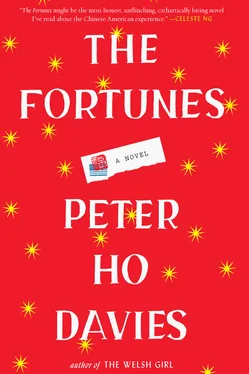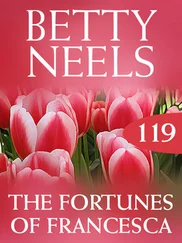That evening he approached her door again, the glimmering window in it. But as he did so he felt a hand on his shoulder.
“’Cuse me, John. You comin’ or goin’?”
Ling stared at the hand — a prospector’s, by the dark sickles of dirt under the nails. He didn’t dare speak, just stumbled back as the other brushed past him and pressed his face to the hatch.
“Evenin’, missy. You dancin’?”
Ling heard the bolt drag back, and the door swung wide, light opening like a fan into the alley. The fellow smoothed the tips of his mustache with thumb and forefinger, then stepped inside, and the fan folded shut. A moment later the shutter snapped closed and the alley was completely dark, but even in the blackness Ling could see the afterimage of the ghost’s face, pale above the brambles of his beard, glowing in the dusk.
He stalked the streets past other cribs, some with girls beckoning listlessly from their windows, but he shied away, veering into the street out of their faint light.
It was very late when he finally returned. Her lamp out, the stove cold, ash piled softly in the grate. Soon it would be time to scrape it out, run water through it to make lye. But first he slept… and dreamt of the elephant. In the streets, forced off the boardwalk, he was obliged to dodge not only piles of horseshit but the animals themselves, the clods of mud thrown up by their hooves and the flick of their reeking, flailing tails. Once one had farted in front of him so loudly that Ling reared back and lost his hat, which looked for all the world as if it had been blown off by the horse. But an elephant might trample such horses, and the whites, laughing or indifferent, who spurred them past him on the street. An elephant, he figured, might just shit on them, or blast their hats from their heads with its trunk if they tried to jostle him aside.
It came to him now, sitting beside Crocker all these years later, that a locomotive was the nearest he’d come to an elephant. The first time he’d seen one it had spooked horses, thrown a man sprawling. He’d been making deliveries. Men were running and then he was running— from them for a panicked instant, then, as they drew level and passed him, with them, parcels jumping wildly at the end of his carry pole. He’d thought it was a fire at first; there was a pillar of smoke over the rooftops. He wasn’t the only one; others were coming with buckets slopping. Then he heard the shrill of steam and he knew, even before he rounded the corner.
Ng had described an engine to him once—“a great hot iron come to smooth the earth”—but Ng had been doing laundry too long; an iron horse on an iron road wasn’t iron ing (even if the engine with its pilot did resemble a flatiron). To Ling the engine seemed like a live thing, scaled with soot, snorting and shuddering and shivering the ground. When it lurched into motion, men fell back. The great brass bell yawned so wide he could see the tongue dangling in its throat, like a cry of “Gold!” Describing it later to Little Sister (“You’re making it up.” “No, no!” he swore), he said it was like a New Year’s parade — the crowds, the raucous clanging racket, and at the heart of it the train, bedecked in red-white-and-blue rosettes and crepe streamers, like a dragon, its fiery face and lantern eyes and long, trailing body. He’d actually glanced down to see if there were feet beneath it, arms supporting it.
And now I’m riding in one, he thought, watching the trail of cindery smoke widening in their wake like a rent in the very sky. How he wished she could see him.
All those weeks he had assumed that she didn’t know he was there behind the laundry line while she bathed, but the morning after he snapped at her she dropped her soap and, when she bent to look for it, their eyes met beneath the sodden edge of the drying clothes.
“Did I wake you?” she asked matter-of-factly.
He nodded dumbly.
“Don’t look so worried. No money lookee. But since you’re up, you might help.”
He parted the sheets between them, their wet corners licking at his calves, and ducked under the line, remaining stooped to disguise his erection. A fresh kettle boiled on the stove, filling the air with steam like incense in a temple. She was holding a cloth behind her back and he took it and began, gingerly, to wash her. “Harder,” she instructed, and when he hesitated, she begged him, giggling, “Harder, harder,” and he rubbed her firmly, angry at the mockery, until her flesh turned fiery beneath the cloth.
“Thank you,” she said simply when he was done. She had been sitting up, her knees drawn to her chest and her arms encircling them. Now she lay back slowly, her neck on the edge of the tub, her eyes closed. He watched the soap scum drift across the water like clouds until the surface was still and clear. Her breasts seemed to float just beneath, the water lapping her throat gently with each breath.
“I don’t mind it so much, if I can have a bath every day.” She opened an eye, pinched her arm, her cheek. “See, good as new.”
Still, she must have sensed his pity. He was thinking of the frayed shirts, the torn and mended pieces he washed and ironed.
With a splash she stood up, dripping so that he fell back. She let him look for a moment, her skin flushed and untouchable, then she wrapped herself tightly in a towel. “It’s only work, after all. Everyone works. I make sheets dirty, you wash them.” She was hardened, he decided — such an odd contrast to her smooth, soft flesh. “At least I don’t do laundry now. All I wash is myself.”
Perhaps he was thinking of her jibes, or maybe her ghost lovers — the irony was that because of her cleanliness, she had more custom than the typical tart, who might bathe but once a week — but that afternoon, when he was harassed by the local urchins, he lost his composure, lashed out. They’d been waiting for him earlier than usual, and when they’d pulled his hair he’d stumbled, gone down on one knee in a runnel of horse piss, still warm. He’d been even more enraged at the thought that the clean laundry might have been dragged through the mud, and when they’d come after him again, he’d swung his pole sharply. He’d only meant to bowl one of them over with the soft weight of a laundry sack, perhaps spill a cap into the dirt, but he misjudged and cracked a rawboned boy about the ear. The amusement of his fellows had faded quickly when the lad took his hand away to show them the blood. He wiped it off on his shirt, and Ling had wanted to tell him Don’t! They’d set on him in earnest then, the lot of them piling on so that Ling was knocked down, his face clawed and cut, his queue yanked and stamped into the mud, his packages strewn about. They looped his queue around his neck twice, like a noose, and pulled him to his feet, led him like a dog up and down the street. When he broke away they tripped him again, set about him with their boots this time, until he could only curl up, clutching the dirt as if to burrow into it. They drew a pair of drawers over his head like a bag, sat on him, stuffed the foul thing into his mouth—“Lick it clean!”—until he gagged. Finally, pulling him to his feet, they drew his queue up between his legs to hobble him, proclaiming to the laughter of the gathering crowd their intent to “send him home with his tail atween his legs.” They only lost their nerve at the edge of Chinatown, releasing him but flinging his pole and laundry after for good measure.
He’d been spitting with rage, had run into the laundry for the cleaver when Little Sister put a hand on his arm. He made to pull away, inhaled a wince. “Ribs,” she pronounced, stilling him with a touch. He held his ragged breath while her fingers traced his sides. “Just cracked, I think.” She pulled him over to a stool and filled a basin and cleaned his face as best she could while he turned it from her (and yet followed her shivering reflection in the basin water). Only when she’d sewn up the gash over his eyebrow did he steal a direct look at her: the purse of her lips as she tugged the thread through his flesh the same as when she repaired any other ripped item, except this time when she bit the thread, she leaned in close to his brow and he felt the brush of her lips, or perhaps her teeth, before the thread snapped.
Читать дальше












